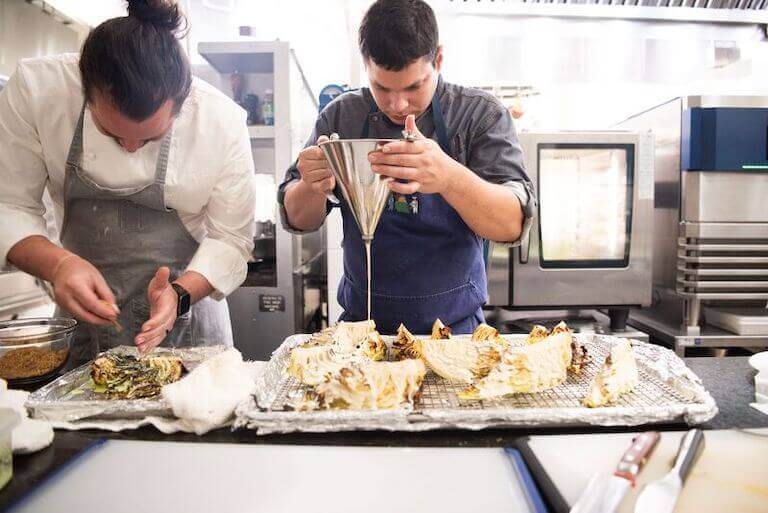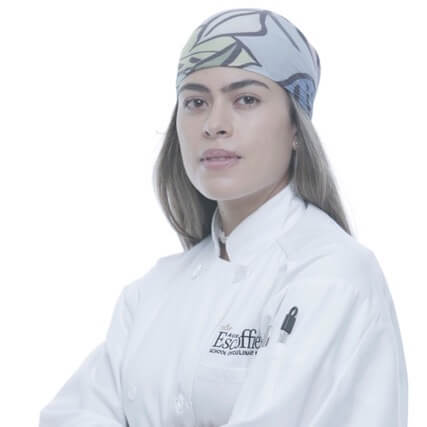Did you know that more Americans than ever before are following a plant-based diet? According to a survey conducted by The Medical Inspiration Daily for Stronger Society, 50% of vegans pursue this diet because of its health benefits, and more than 7 out of 10 vegans expect to continue their diet for the next 5 years—which puts them in plant-based territory.
Also, based on this Bloomberg Intelligence report, the plant-based foods market could account for 7.7% of the global protein market by 2030. Needless to say, if you’re considering a career as a plant-based chef, there’s never been a better time to start than now. Here’s what you need to know about the credentials and certifications that might be helpful to work as a plant-based chef.
There Are Many Paths to the Plant-Based Kitchen
No matter what kind of chef you hope to become, there is no single credential that can earn you that title. You become a chef when you get your first chef position, often as a sous chef. Even then, when people refer to “the chef,” they usually mean the executive chef. And there can be many roads to that coveted role!
The Difference Between a Chef and a Cook
- A chef is a highly-skilled culinary professional. Chefs usually have years of training and job experience, and exert considerable control over the menu, recipes, and the way the kitchen is run. They can manage the entire kitchen, from line cooks to prep cooks to dishwashers and possibly expeditors.
- A cook is a valuable kitchen employee who is usually more task-focused. They do food prep and execute dishes for guests under the direction of chefs, but they don’t necessarily contribute to recipe development. Some cooks are on the path to becoming chefs, but others prefer to stay cooks throughout their careers.
When it comes to stepping into the role of a vegan chef, some cooks attend plant-based culinary school to get started in their careers. They may pursue a diploma, an associate degree, or a bachelor’s degree. Others may choose to study general culinary arts, including meat-based cooking, and transition to plant-based later. And others won’t attend culinary school at all, getting their training on the job.
Whichever route you choose to become a chef, you may have to bolster technical skills (like knife handling, seasoning, and plating); business skills (like cost control and inventory management); and professional skills (like efficiency and teamwork). As an aspiring plant-based chef, the skill set is very similar. But instead of discovering how to cook various meat-based proteins in your technical skills, you can dive into the wonderful versatility of nature’s bounty—plants.
In a plant-based culinary school, you can begin to do just that.
Listen to some of these favorite plant-based episodes on The Ultimate Dish Podcast:
- “People, Planet, Plants, Profit:” Chef David Delcourt’s Sustainable Business Model
- Why Plant-Based Food is the New Love Language
- How Donna Merten is Changing Food Sustainability, “One Plate at a Time”
- From Pharmacy To Farmacy: Dr. Amy Sapola On Plant-Based Eating, Health, And Well-Being
- Plantstrong CEO Rip Esselstyn: Not All Plant-Based Foods Are Created Equal
Education Can Give You a Head Start
To become a plant-based chef, just like any other chef, an education can give you a leg up. By dedicating your time and efforts to an education in a plant-based culinary school, you can access a wide range of skills and concepts that could take many years to garner on your own or on the job.
Plus, some chefs may prefer to hire cooks that have a culinary school credential on their resume. It can show that they have some basic skills and that they’ve made an investment in their careers. A culinary degree or diploma may never close doors throughout your career….but it could open them!

Escoffier student preparing to attend a farm-to-table class, as part of the plant-based curriculum.
Escoffier’s Plant-Based programs are offered online and at our Boulder campus. These programs focus on using fresh vegetables, fruits, nuts, legumes, whole grains, and plant proteins to create delicious and healthful dishes. Students can also explore ingredient substitutions, so they can recreate a huge variety of dishes with plant-based ingredients. They discuss business topics like cost control and entrepreneurship. And they dig into the professional side, with coursework on management and training.
On top of this, students complete this well-balanced curriculum with the guidance of seasoned plant-based Chef Instructors, such as Director of Education Stephanie Michalak White who helped in the actual launch of Escoffier’s Plant-Based program. Chef Stephanie comes to the table with over a decade of professional experience, such as designing curriculum for a teaching kitchen at an organic farm in Ohio. She also holds her Master of Arts in Food Studies and a doctorate in Higher Education Leadership, and participated in coordinating a pilot study on how healthy foods and lifestyle choices can potentially address prediabetic symptoms. As you can imagine, the opportunity to study under chefs like this can transform your educational experience as an aspiring plant-based chef.
“In [Escoffier’s plant-based programs], you are able to learn a lot of skills you’re going to need in the future. You are not only learning your recipes—you’re learning the skills you are going to use in life. For me, it was the best option to follow my dream of being a private chef along with what I already do [as a health coach]. All the skills that I’ve learned at Escoffier… provide a path for me. All the skills I’ve learned will help me become a private chef.”*
Maria Rodriguez, Escoffier Online Plant-Based Culinary Arts Student*
At the end of the program, Escoffier’s plant-based culinary arts graduates can be ready for their first entry-level cooking jobs, with the education they may need to become an asset to their teams right away.
Plant-Based Culinary Externships
Another invaluable benefit of attending plant-based culinary school is getting to complete a hands-on externship while completing your education. This is a hugely impactful opportunity for aspiring plant-based chefs to gain hands-on training at a reputable plant-based eatery, shadow chefs who may solely focus on this type of cuisine, and actually try plant-based foods that consumers are craving.
Students may choose to work at an establishment that is not fully plant-based–sometimes due to their location or other personal needs–and can still gain invaluable experience putting their culinary skills to work. Some students have mentioned that they have also helped their externship site incorporate more plant-based offerings!
Depending on the program, Escoffier students must complete one to two industry externships before graduation. Often, students begin to build a strong rapport with their externship supervisors, which can lead to future job opportunities and lasting relationships!

Escoffier student at a Chef’s Garden Event, preparing a gourmet salad using seasonal ingredients with fellow peers.
Experience Can Build on Your Education
Once a plant-based student is out of school and enters the workplace, they can start climbing the ladder towards becoming a chef.
Often, the first job out of culinary school is as a prep cook. Cooks work on perfecting their technical skills and continue learning from their managers and more experienced peers. Once they prove themselves in prep, they may move on to become line cooks before earning their first supervisory positions.
The Kitchen Hierarchy
Most aspiring chefs may have to climb the ladder to get to an executive chef position. Here’s a breakdown of the kitchen hierarchy—known as the brigade de cuisine:
- Executive Chef: typically takes charge of the entire kitchen
- Sous Chef: second-in-command to the executive chef and oversees all other chefs in the kitchen
- Garde Manger: prepares all cold dishes
- Pastry Chef: responsible for creating dessert menu offerings
- Sauce Chef: takes over soups, stocks, broths, etc.
- Line Cook: usually cooks at any given kitchen station and performs the bulk of the cooking
- Prep Cook: in charge of food prep, such as dicing and chopping ingredients
A chef has to provide mentorship and leadership to their cooks. They will ideally be able to balance great food with a profitable menu. And they’re often expected to know more than anyone else in the room. That kind of confidence and know-how comes with time. That’s why a culinary degree isn’t all it takes to become a chef. It’s a title that must be earned, whether you’re in a Michelin star restaurant or the little plant-based bistro down the street.
Where You Can Work as a Plant-Based Chef
Outside of working at vegan restaurants or eateries, plant-based chefs can work in several diverse workplace environments, including:
- Pop-up restaurants
- Food trucks
- Natural food markets
- Natural food brands
- Bakeries
- Catering services
- Private chef services
- …and many other possibilities!
Additional Plant-Based Certifications
There are lots of optional certifications for cooks and chefs from industry groups like the American Culinary Federation. These can prove that you’ve attained a certain level of cooking experience.
That said, there aren’t many certifications specific to plant-based cuisine available yet. But with so many cooks and consumers expressing interest in this lifestyle, it’s only a matter of time before these could become more established. And if you’ve already received your degree or diploma from a plant-based culinary school, it can be that much easier to earn an extra certification when one becomes available.
Start Your Plant-Based Journey with an Education
The only “credentials” a plant-based chef truly needs are the education and experience to lead a kitchen. For many, that path begins in culinary school, exploring plant-based cooking classes.
To discover what you could learn in Escoffier’s Plant-Based culinary arts programs, get in touch with our Admissions Department. They can help answer all your questions about curriculum, financial aid, and more!
To learn more about becoming a plant-based chef, try these articles next:
- How Plant-Based Dishes are Shaping Restaurant Menus
- Plant-Based Classes: A Guide to Culinary School for Vegans and Vegetarians
- Escoffier Graduate Talks About Going Plant-Based—In Culinary School and in Life
This article was originally published on March 6, 2022, and has since been updated.
*Information may not reflect every student’s experience. Results and outcomes may be based on several factors, such as geographical region or previous experience.

 “In [Escoffier’s plant-based programs], you are able to learn a lot of skills you’re going to need in the future. You are not only learning your recipes—you’re learning the skills you are going to use in life. For me, it was the best option to follow my dream of being a private chef along with what I already do [as a health coach]. All the skills that I’ve learned at Escoffier… provide a path for me. All the skills I’ve learned will help me become a private chef.”*
“In [Escoffier’s plant-based programs], you are able to learn a lot of skills you’re going to need in the future. You are not only learning your recipes—you’re learning the skills you are going to use in life. For me, it was the best option to follow my dream of being a private chef along with what I already do [as a health coach]. All the skills that I’ve learned at Escoffier… provide a path for me. All the skills I’ve learned will help me become a private chef.”*